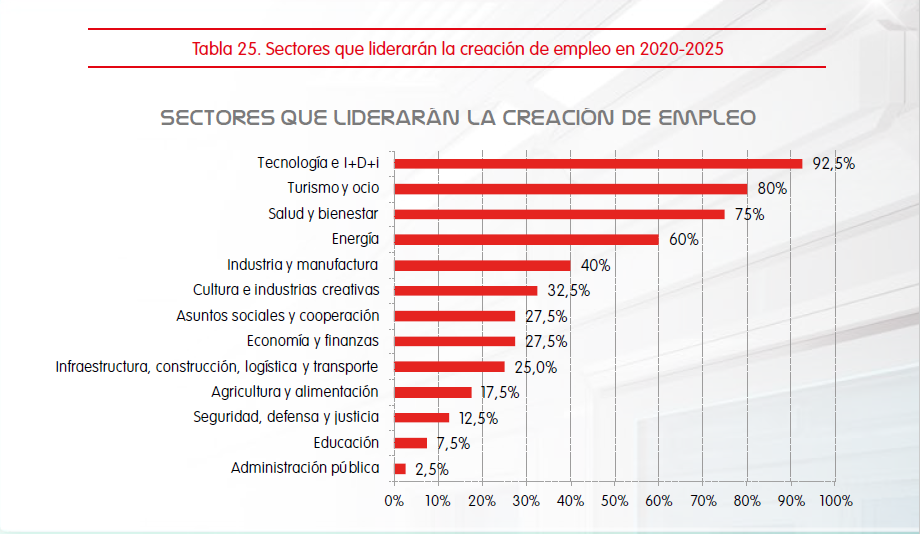A few days ago a colleague wrote me an email suggesting that I write about some attitudes of rejection taken by people against technology and the dilemma that some jobs were faced with the imminent automation in the future. In this regard it is important to point out that everything is a process that entails his years, but the advice in this case is not to see the negative but to look forward thinking about the job opportunities of the future for us and our children. It will always be important to analyze the labor trends to train us and remain valid.
The latest report carried out by Randstad Research, the Randstad Study Center, reveals that technology and digitization will affect the general economy, the forms of consumption, and, therefore, the labor market. This market is experiencing a great evolution as a result of the new professional generations (Millenials and the Z generation), which leads us to question the trend in the coming years until 2025.
The experts of the Randstad Study Center believe that the evolution of any country will go to generate goods and services with high added value. Economic development in Latin America will depend in large part on the country’s capacity to generate scientific, technological and innovative knowledge and to have a business leadership in R & D & I in the region. These experts believe that the qualities that workers must meet in 2025 will be focused on transversal skills that share all the profiles, regardless of the specific training.
Organizations are aware that the motivation, satisfaction and self-realization of the worker are vital to maintain a good working environment and improve productivity, which will allow their employees to reconcile work and personal life, create more motivational work environments and direct its policies to foster trust among employees.
Adecco, a world leader in human resources management in collaboration with Opinno, has also carried out a study on the future of work, offering a vision of labor trends that will emerge in the coming years. Noteworthy is the dissolution of the traditional economy division, which included the primary, secondary and tertiary sectors. As a result of the productive transformation, new sectors begin to lead the creation of employment, and others will do so in the coming years. Among them, experts focus more on technology and R + D + i (Research, development and innovation), without neglecting the tourism and leisure sector, health and well-being and in the energy sector.
R + D + i is a new concept adapted with technological and investigative advance focused on the advancement of society, being one of the most important parts within information technologies.
In this sense, the qualified profiles linked to technology and the digital domain, the profiles linked to dealing with people and those specialized in marketing and sales will be the most relevant in the next 7-10 years. On the other hand; Experts point out that this will have negative repercussions since many jobs considered “traditional” will be impacted by automation.

Social trends that affect the labor market
The emergence of new technologies that increasingly have shorter life cycles, globalization or demographic changes are some of the trends that affect the political, economic and social, and of course, also the labor. So things; The factors of change that occur outside the scope of work but that will influence it directly in the coming years will be:
a). The companies consider that the new technologies force them to reinvent themselves and, therefore, to reinvent their ways of working. For this reason they must develop an ability to adapt to new patterns.
b). In terms of labor relations, labor market legislation is being globalized and innovative management models are being exported to emerging countries, with cultural, economic and business values.
c). Another factor that will impact 55% according to experts, will be the new means of communication and social relations which will multiply over time among companies.
The impact of technology at work
Definitely technology is revolutionizing the world, and also the labor market. And seeing it positively in this aspect would be creating a greater percentage of new jobs resulting from new technologies and the entry of technology companies in the region.
On the other hand; they would be modifying work standards. Since the experts believe that collaboration at a distance will be the trend with the greatest expected impact in relation to technologies. The technological transformation will favor the relocation of work and will allow the creation of collaborative learning communities. It is not simply a matter of generalized use of teleworking when possible, but that these advances would allow a labor relationship to be based on trust in the worker by the companies as well as on the performance of the same.
As well; In this sense, the total availability of information in the network, together with the increase of human capacities and productivity, will greatly influence. The challenge will be to achieve the balance of professional and working life and generational adaptation to new developments.
“The only possible way is the fusion between machines and men” Elon Musk
The employment of the future: sectors that led the hiring of personnel
Among the new sectors, the HR experts have indicated 4 as those with the greatest future projection, these are:
1. The technology and R + D + i sector as I have already mentioned. It is considered the area that generates more employment in the next 7 to 10 years, as indicated by 92.5% of the experts consulted. It goes through the generation of scientific, technological and innovative knowledge and to have a business leadership in R + D + i. This great challenge will be linked to the digital transformation, the profitability of the sector and the creation of startups.
Technology and investment in development and innovation will lead to the creation of new employment opportunities, especially those linked to biotechnology, e-commerce and ICT (Information and Communication Technologies).
2. Tourism and leisure have been considered key sectors for years, but will grow more in the coming years. The experts in this matter consider that it will be the one that generates the greater number of uses, mainly by the necessity of improvement in transports and the increasing demand of leisure on the part of the society.
Although it is a consolidated sector, it will also suffer its transformation, such as dealing with seasonal employment, the adaptation of companies to new technologies or the highest income for each tourist that will generate more quality leisure time.
3. In health and well-being they will also be protagonists in the future of the labor market. Where it is considered an advance according to the aging of the population and the increase in demand for improvement of the quality of life by society. In this sense, consumption habits and concern for quality of life will be decisive. All of these generate jobs oriented to palliative care, to the elderly, to nutrition and sports, to psychological care, the pharmaceutical industry and public health.
4. Energy will become a fundamental pillar in the next decade in the region, through alternative energies, such as renewable energies, which will favor the creation of new jobs. Where the sector has challenges such as: the environmental sustainability of the electrical system, the reduction of its social and environmental impact, and the management and certification of the energy system for the next 25 years.
Another sector that will continue to lead the creation of employment, although in a smaller proportion will be industry and manufacturing with the challenge of integrating technology in this sector, offering greater price competitiveness and creating new jobs.
On the contrary there will be sectors that will find more difficulties to create employment in the coming years, and that coincide with the most traditional and those most affected by the economic crisis, such as: trade and agriculture, construction and banking, on the other . All these sectors must reinvent themselves in order to continue having a specific weight within the industry.

Skills and profiles of the workers of the future
For the experts in HR consulted by Adecco, there is already a deficit of professionals with a digital profile that could be extended in the future. Moreover, for them, the most relevant professional profiles in the future will be related to existing jobs associated with technology, sales and dealing with people.
The fastest growing ones are the qualified technological or digital profiles, motivated by the great weight that the sector will have in the next 7-10 years. Among them will stand out the big data analysts, the ones oriented to solve complex problems in the field of engineering, the specialists in social networks or the hybrids between design and technology, even profiles like youtubers.
Profiles related to dealing with people will also gain relevance, as is the case of coaches, business facilitators, managers of new forms of work or psychologists. Finally, specialized profiles in sales or marketing, with greater emphasis on qualified specialists in business development and technical sales.
Experts in human resources believe that the qualities that workers must meet in 2025 will be focused on cross-cutting skills that share all profiles, regardless of ranges, specificities or specific training.
The main ones that stand out are the collaboration skills, which include teamwork and the ability to work remotely (not only focused on teleworking but in the management of tasks or projects). They also value the skills for change management, which range from polyvalence and constant learning to intrapreneurship and innovation. The technical skills and orientation to results and interpersonal skills, such as the communicative capacity of workers and leadership, which are already being demanded, will become even more important.
I’D LOVE TO HEAR YOUR THOUGHTS?
